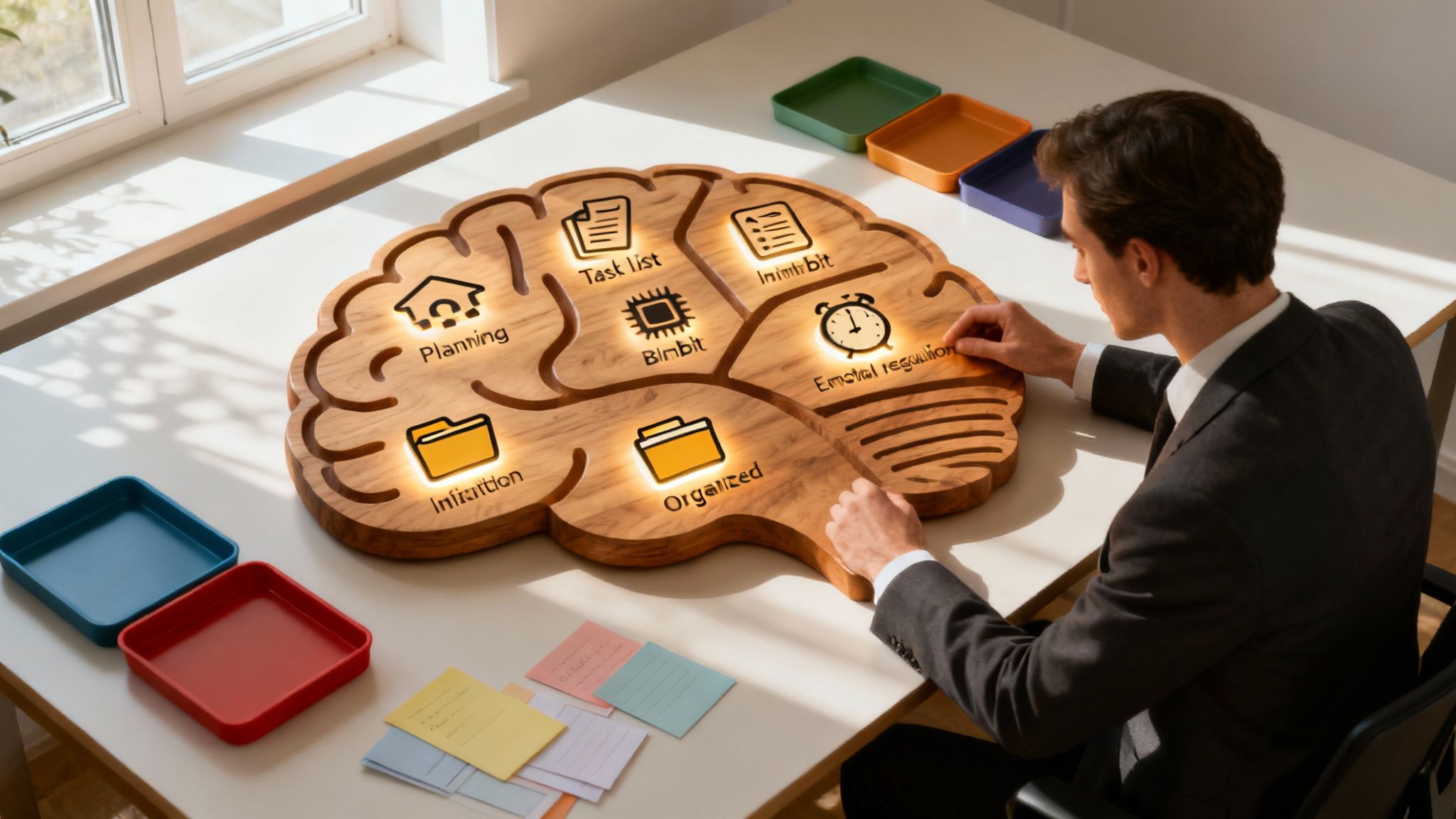As an ADHD coach, one of the most common questions I receive is this:
How do I know when I need more support for my ADHD?
Sometimes we’ve learned to mask our ADHD symptoms so efficiently, we don’t always notice when it's going out of hand. The simplest answer to this question?
If you have to ask, you probably already know the answer.
But it can be a useful exercise to look at the red flags of uncontrollable ADHD mayhem, with the goal of increasing our self-awareness and finding help sooner rather than later. So, what are the signs we need to look for?
Here are five of the most common indicators that you've lost control of your adult ADHD.
Too long; didn't read
Common signs that your ADHD may be out of control include:
- Overwhelm
- Avoidance
- Fatigue
- Frustration
- Intense emotions or mood swings
The most important thing is to not assume that you can handle it on your own. While you may consider yourself to be functioning well enough, these red flags can be indicators that things may become much worse. Seek out support where you can find it, and know that you aren’t alone in your struggles.
5 signs your ADHD has spiraled out of control
1. Everything is overwhelming.
ADHD overwhelm is a key indicator that things have gotten a little out of hand—in general, but especially for those with attention-deficit/hyperactivity disorder.
Overwhelm can show up a lot of different ways, but pay special attention to it if it's in response to situations or things that are typically considered “small potatoes” for you— anything that you’ve handled with ease in the past, but are finding more challenging in the present.
If you’re having an outsized reaction to a task that is usually straightforward for you, you might need more support for your ADHD.
Signs of overwhelm
Some other signs of overwhelm include:
- Struggling to prioritize tasks
- Struggling to initiate tasks or transition between tasks
- Shutting down when faced with more than one task
- Feeling like you have a lot of "brain clutter" or brain fog that you can't seem to sort through
2. You’re on an emotional roller coaster.
Emotions are a normal part of the human experience. But when our emotions seem to be in the driver’s seat, taking us for a ride, that’s when we might consider getting more support.
Emotional dysregulation
Emotional dysregulation is the inability to moderate emotions and often causes extreme emotional reactions, fluctuating moods, and difficulty calming down.1
With ADHD, you might notice that your emotions can become hard to control, which may lead to angry outbursts and outsized reactions. If these are becoming more frequent lately, it doesn’t hurt to reach out to a mental health professional who can help you navigate this.
In other words, if you’re crying over spilled milk (as the saying goes), it’s time to reevaluate if your treatment plan is appropriate for you.
3. You have fatigue you can’t explain.

Burnout is a unique experience for children and adults with ADHD. ADHDers with burnout often complain of intense fatigue, usually caused by overcommitment. In addition, we may also feel the following:
- Lack of motivation
- Self-doubt
- Depression
- Cynical outlook on life
The domino effect of exhaustion
If things have become unmanageable with your ADHD, you’re less likely to follow through on tasks and obligations, resulting in a pile-up that saps you of your energy and motivation.
This is a serious red flag that may require:
- Scaling back your commitments where possible
- Practicing rigorous self-care
- Reaching out to your support team
If exhaustion has become a part of your everyday life, please remember that it doesn’t have to be this way forever. You deserve to feel at your best—don’t dismiss chronic fatigue as being the norm!
4. You’re frustrated, especially at yourself.
Frustration is a common feeling for ADHDers, particularly frustration that we direct toward ourselves.
Causes of frustration
Frustration is the bane of having ADHD. We're often frustrated because of things we blame ourselves for, such as:
- Not being able to remember important dates, events, or facts
- Disorganization in our home, car, or work space
- Losing important items
- Making the same mistakes over and over again.
Before I was on ADHD medication, I spent most days feeling irritable, waiting for the next thing to inevitably go wrong. I had no idea that this was a sign that my ADHD wasn’t well-managed (and not to mention, this can be even more intense for those of us with co-occurring depression and/or anxiety).
Practice noticing when frustration comes up for you. If it’s become a dominant emotion in your life, it could be worthwhile to explore what your other treatment options may be.
5. Avoidance has become your primary coping strategy.
Task avoidance is a very common coping mechanism for ADHDers, but it's especially a problem for ADHDers who lack the support that they need and deserve.
Things ADHDers commonly avoid
- Stressful tasks
- Boring tasks
- Important tasks
- Friends
- Emails
- Hygiene
We avoid tasks that stress us out. We avoid our responsibilities and then feel terrible that we’re avoiding them. We avoid friends when our capacity is low, and emails when we can’t string words together. We even avoid basic hygiene when things reach a critical point.
While some avoidance of boring or stressful tasks is normal, avoidance that results in serious consequences, emotional distress, and otherwise feeling “stuck” in avoidance is not. Pay close attention, too, when you’ve started to avoid even those activities that would be fun or relaxing for you. All of these are indicators that you could benefit from more support.
Okay, I get it. I’ve lost control. Now what?
If you know you’re in need of additional support for your ADHD, there are a lot of different options you can explore. Some of these are listed below.
How to take back control of your ADHD
- Find a mental health provider (like a therapist, specialist, or psychiatrist)
- Expand your coping skills and learn more about ADHD (the Inflow app is a great option for this!)
- Consider trying medication to help with symptom management
- Seek out an ADHD coach or professional for individual or group coaching (Coaching is available on the Inflow app, too!)
- Join a support group for neurodivergent people
- Reach out to supportive friends or loved ones








